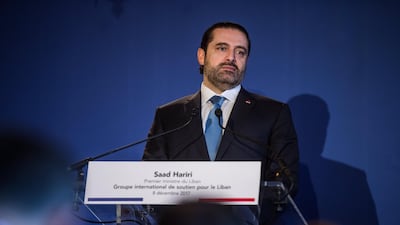Lebanon's Prime Minster Saad Al Hariri on Tuesday ordered government agencies to cut 2018 budgets by 20 per cent, as part of the state's plans to rationalise spending and bring the country's beleaguered public finances into order.
Government institutions have two weeks present their reduced budgets to the Finance Ministry, according to a statement from the Prime Minister's office. The request made by Mr Hariri excludes wages to public servants.
_________
Read More:
Lebanon forecasting debt to GDP to stabilise at 149% in 2018, finance official says
Lebanon needs to offer more in return for foreign investments
_________
Lebanon, saddled with one of the world’s highest debt-to-GDP ratios, expects its 149 per cent debt level of last year to carry over into 2018, as sluggish growth and a lingering fiscal deficit continue to exacerbate the country’s public finances, a senior finance ministry official said earlier this month.
The country's economy is hurting from Syria's seven-year war, which has curtailed an important trade and business route, and led to the influx of one million Syrian refugees. The country’s heavy debt burden is also a concern for investors, who are not as eager as before to invest in a country that is struggling to control it finances.
Lebanon's economy is forecast to expand 2.1 per cent this year in line with IMF estimates, roughly in line with 2017's growth, according to Alain Bifani, the director general of the country's finance ministry.
The country's fiscal deficit is forecast to widen to 8 per cent of GDP in 2018, from 7.7 per cent deficit last year, he said.

